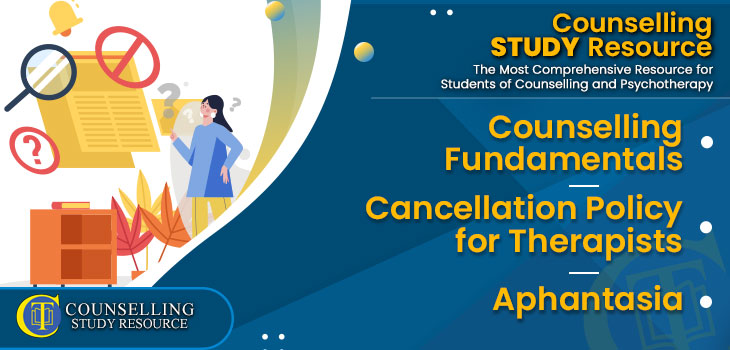281 – Cancellation Policy for Therapists
Counselling Fundamentals – Aphantasia
NOTE: The Counselling Tutor Podcast is a free resource, which is available on the main Counselling Tutor website. We also place it in CSR for your ease of access. Unlike our other CSR resources, podcast episodes may include presenters’ opinions, and are not intended to be referenced for academic use.
In Episode 281 of the Counselling Tutor Podcast, your hosts Rory Lees-Oakes and Ken Kelly take us through this week’s three topics:
- Up first in ‘Student Services’, Rory and Ken discuss the benefits of going back to the counselling fundamentals.
- Then in ‘Ethical, Sustainable Practice’, we look at the importance of cancellation policy for therapists.
- And lastly in ‘Practice Matters’, Rory speaks with Sassy Smith, founder of Aphantasia Academy, as she shares her insight into one specific area of neurodivergence, aphantasia – the inability to visualise.
Counselling Fundamentals [starts at 02:30 mins]
Counselling Foundations is sponsored by
Counselling Skills Academy
Learn counselling techniques by seeing counselling skills used in real sessions by qualified therapists.
Real sessions - real-life presentations - real skills.
Whether you're a student or an experienced practitioner, remembering and revisiting your counselling fundamentals can be a huge help to you in your practice. In this section, Rory and Ken go over these fundamentals and their importance:
- Timekeeping – before a client comes in, take time to ground yourself. Find that ability to put everything else out of your mind and be able to focus on the person that will be in front of you.
- Being attentive – giving the space and time for a client to speak. Providing that safe environment.
- Active listening – don’t just listen, hear.
- Silence – allowing silence in the therapy room can actually be incredibly useful. Don’t try to fill every gap.
- Wrapping these skills around the core conditions – empathy, frame of reference, tuning in to someone else.
- Still being yourself – not just a professional helper. It’s important to still be real in order for the client to build up that trust in the therapeutic relationship.
- Look at the pace the client is going at – meet them where they are.
- Summarise – gives the client an opportunity to refine/alter how you understood what they said. It allows them to set us right if we land outside of their frame of reference.
A handout on Counselling Fundamentals is available for download in the green button above.
Cancellation Policy for Therapists [starts at 20:29 mins]
When it comes to running your own private practice, it’s important that you're treating it as what it is – a business. In this section, Rory and Ken discuss the importance of factoring cancellations and no-shows into your policy and client contracts:
- It’s important to protect your income. Having a therapy cancellation policy can help you do that.
- You deserve to be paid for your time, and the time you set aside for a session.
- Include a cancellation policy in your therapy contract and make it clear to your client.
- You might decide that cancellations are non-refundable if made within 24hrs of the session.
- You may choose to take payment for sessions in advance e.g. by having a client pay for two sessions at a time, you will already be covered for a cancellation or no-show fee.
- Decide what works best for you.
Aphantasia [starts at 36:54 mins]
The National Counselling Society is proud to sponsor Practice Matters.
NCS are really excited to have launched their Children and Young People Therapist Register for counsellors working with the younger age group.
In this week’s ‘Practice Matters’, Rory speaks with Sassy Smith about Aphantasia, and some things to consider if you’re counselling a client with aphantasia.
The key points of this discussion include:
- Aphantasia is the inability to create mental images on demand.
- Things relating to visualising such as visualising themselves in a different place or in the future.
- Most people can still dream and visualise whilst on the verge of consciousness.
- Having aphantasia means that counselling methods such as guided imagery and mindfulness won’t be of much use to the client.
- The counsellor can take steps to understand what the client can do or not do, and discuss with them to find what works.
- Someone with aphantasia may also have SDAM – the inability to access memories.
- It shouldn’t always be assumed that someone who can't easily access their early memories has experienced trauma or abuse.
- People who were born with aphantasia may have just adapted without realising that they have it.
- However, it’s also possible to lose your ability to visualise.


